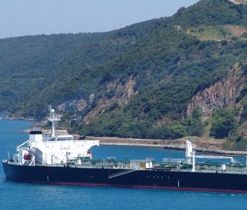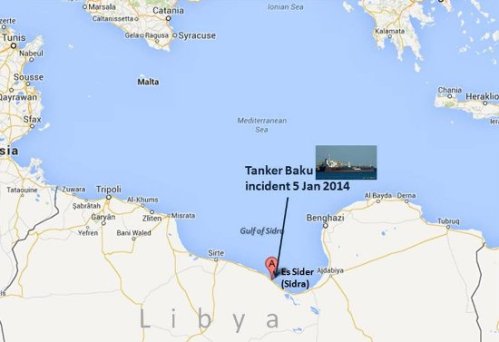The Libyan navy reportedly fired on Sunday
at a tanker that tried to enter a militia-held port in Eastern Libya to
load crude oil illegally. The tanker refused orders to change course,
and fled Libyan waters, apparently toward Malta.
The interesting aspect of the event is that the tanker in question doesn’t seem to be a rusting bolt-bucket of uncertain parentage, but rather a ship owned by a respected Turkish shipping company, which has a large, modern fleet and does business all over the world.
There is no reason to suspect that the Turkish company is involved in the skullduggery off the Libyan coast. The question is who is involved: who chartered the ship, and what are the charterer’s connections with the Libyan tribal militias that hold the “break-away” oil ports on the eastern coast?
The tanker in question is a ship named Baku, which was built by Sumitomo and delivered to Palmali, the Turkish shipping company, in 2003. She’s a pretty, well-kept ocean-going tanker, one of five in Palmali’s Aframax sub-class fleet. A contributor to the Shipspotting.com website photographed Baku off Tarragona, Spain on 18 December. At that time, Baku was coming from stops in Skikda (Algeria) and Fos-sur-Mer (Marseille, France), and heading for Malta “for order”; i.e., to await chartered tasking. Nothing out of the ordinary in this itinerary, particularly for a shipping company that has had long-term contracts with big oil companies like Lukoil and Socar.
In Eastern Libya, meanwhile, tribal militias that proclaimed autonomy from the national government in Tripoli during the Arab Spring uprising have had control of ports and oil terminals for some time, and have basically been holding the oil hostage there for months. Tribes and oil industry workers have been unable to synchronize agreements with the national government that would allow the oil to start flowing again from the holding tanks at the Eastern ports.
Besides the Libyan national oil companies, the owners of the oil include American firms ConocoPhillips, Marathon, and Hess. Canada’s Suncor and France’s Total also have ownership stakes.
We can assume, however, that none of these companies chartered the Baku to try to load their crude illegally on 5 January. I assume the attempt was made by someone in collusion with an Eastern tribal militia (or a coalition of collaborators from more than one). The militias control the ports, including the port of Es Sider (Sidra), where the tanker tried to make the pickup. They would presumably pay off oil industry workers to participate in the illegal transaction, in which the militias would sell the oil and pocket the revenues.
But who is Royal Asset Management, which a Libyan official named as the company chartering Baku for this expedition? Reuters reporters were unable to turn up anything, and there seems to be a good reason for that. There are a number of financial companies around the world with the words “Royal Asset Management” in their names, but none whose involvement in this escapade appears likely or sensible.
The Turkish company Palmali was founded by an Azerbaijani, Mubariz Mansimov, in Istanbul in 1998. Its profile is fast-growing but quite typical for the industry. There are no apparent Azerbaijani links that seem to have any relevance to the Baku incident. An Azerbaijani methanol company was negotiating with the Libyans early in 2013 to set up a joint venture, but that connection, like Palmali’s ownership of Baku, appears to represent legitimate business.
I assume that whoever tried to complete this transaction is someone who’s interested in helping the Libyan tribal militias earn cash, or at least is simply willing to. Top prospects would be money-launderers in Malta. But terrorist financiers, or even operatives, shouldn’t be counted out. It’s probably someone who doesn’t need the money himself, and who is more interested in other aspects of the deal, but will be happy to make a buck reselling any crude the Libyan militias can come up with. It might, of course, be an arms smuggler trying to pull off a barter exchange.
The quality this entity needed, to set up the aborted transaction with Baku, was an appearance of legitimacy sufficient to charter Baku through Palmali, which presumably means conventional bona fides and payment methods. Such a profile is easy enough to create on the fly. For me, it’s the most interesting aspect of the event, however. Instead of a more typical smuggling profile, with smaller, more anonymous ships skulking close to the coast, it suggests a greater potential scale and impact for black-market trade in the Mediterranean than we have had to think about for many, many years. Someone is out there with a vision for it. Trying to bring this off with Baku was a bold move.
Italy, Greece, and Egypt will view this development with concern. Lloyd’s will sit up and take notice. The poorly governed Barbary Coast has been a problem for law, order, and maritime security for millennia. Shots fired at sea, warring Libyans, mutinous ports, hostage cargos, mystery charters, shadow “godfathers” – it’s all there. The Barbary Coast is back.
J.E. Dyer’s articles have appeared at Hot Air, Commentary’s “contentions,” Patheos, The Daily Caller, The Jewish Press, and The Weekly Standard online. She also writes for the new blog Liberty Unyielding.
The interesting aspect of the event is that the tanker in question doesn’t seem to be a rusting bolt-bucket of uncertain parentage, but rather a ship owned by a respected Turkish shipping company, which has a large, modern fleet and does business all over the world.
There is no reason to suspect that the Turkish company is involved in the skullduggery off the Libyan coast. The question is who is involved: who chartered the ship, and what are the charterer’s connections with the Libyan tribal militias that hold the “break-away” oil ports on the eastern coast?
The tanker in question is a ship named Baku, which was built by Sumitomo and delivered to Palmali, the Turkish shipping company, in 2003. She’s a pretty, well-kept ocean-going tanker, one of five in Palmali’s Aframax sub-class fleet. A contributor to the Shipspotting.com website photographed Baku off Tarragona, Spain on 18 December. At that time, Baku was coming from stops in Skikda (Algeria) and Fos-sur-Mer (Marseille, France), and heading for Malta “for order”; i.e., to await chartered tasking. Nothing out of the ordinary in this itinerary, particularly for a shipping company that has had long-term contracts with big oil companies like Lukoil and Socar.
In Eastern Libya, meanwhile, tribal militias that proclaimed autonomy from the national government in Tripoli during the Arab Spring uprising have had control of ports and oil terminals for some time, and have basically been holding the oil hostage there for months. Tribes and oil industry workers have been unable to synchronize agreements with the national government that would allow the oil to start flowing again from the holding tanks at the Eastern ports.
Besides the Libyan national oil companies, the owners of the oil include American firms ConocoPhillips, Marathon, and Hess. Canada’s Suncor and France’s Total also have ownership stakes.
We can assume, however, that none of these companies chartered the Baku to try to load their crude illegally on 5 January. I assume the attempt was made by someone in collusion with an Eastern tribal militia (or a coalition of collaborators from more than one). The militias control the ports, including the port of Es Sider (Sidra), where the tanker tried to make the pickup. They would presumably pay off oil industry workers to participate in the illegal transaction, in which the militias would sell the oil and pocket the revenues.
But who is Royal Asset Management, which a Libyan official named as the company chartering Baku for this expedition? Reuters reporters were unable to turn up anything, and there seems to be a good reason for that. There are a number of financial companies around the world with the words “Royal Asset Management” in their names, but none whose involvement in this escapade appears likely or sensible.
The Turkish company Palmali was founded by an Azerbaijani, Mubariz Mansimov, in Istanbul in 1998. Its profile is fast-growing but quite typical for the industry. There are no apparent Azerbaijani links that seem to have any relevance to the Baku incident. An Azerbaijani methanol company was negotiating with the Libyans early in 2013 to set up a joint venture, but that connection, like Palmali’s ownership of Baku, appears to represent legitimate business.
I assume that whoever tried to complete this transaction is someone who’s interested in helping the Libyan tribal militias earn cash, or at least is simply willing to. Top prospects would be money-launderers in Malta. But terrorist financiers, or even operatives, shouldn’t be counted out. It’s probably someone who doesn’t need the money himself, and who is more interested in other aspects of the deal, but will be happy to make a buck reselling any crude the Libyan militias can come up with. It might, of course, be an arms smuggler trying to pull off a barter exchange.
The quality this entity needed, to set up the aborted transaction with Baku, was an appearance of legitimacy sufficient to charter Baku through Palmali, which presumably means conventional bona fides and payment methods. Such a profile is easy enough to create on the fly. For me, it’s the most interesting aspect of the event, however. Instead of a more typical smuggling profile, with smaller, more anonymous ships skulking close to the coast, it suggests a greater potential scale and impact for black-market trade in the Mediterranean than we have had to think about for many, many years. Someone is out there with a vision for it. Trying to bring this off with Baku was a bold move.
Italy, Greece, and Egypt will view this development with concern. Lloyd’s will sit up and take notice. The poorly governed Barbary Coast has been a problem for law, order, and maritime security for millennia. Shots fired at sea, warring Libyans, mutinous ports, hostage cargos, mystery charters, shadow “godfathers” – it’s all there. The Barbary Coast is back.
J.E. Dyer’s articles have appeared at Hot Air, Commentary’s “contentions,” Patheos, The Daily Caller, The Jewish Press, and The Weekly Standard online. She also writes for the new blog Liberty Unyielding.


No comments:
Post a Comment